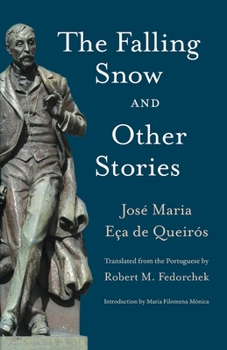The Falling Snow and other Stories
The great nineteenth-century Portuguese author Jose Maria Eca de Queiros (1845-1900) has long been known for his novels, especially The Crime of Father Amaro (1880) and The Maias (1888). However, he also wrote short stories, and a number of them, having stood the test of time, are now regarded as masterpieces. Although there is no question that Eca owes the lion's share of his reputation to his long fiction, the tales in this collection tell us that we are reading the work of a writer in full control of both genres. The eleven selections range widely in theme and length and, except for "The Catastrophe"(which was published posthumously), are arranged in order of the year of publication. "The Falling Snow" and "Master Devil" contain elements of both the fantastic and realistic, a number of which call to mind Edgar Allan Poe, a writer whom Eca read and greatly admired. The power of love becomes the obsession of love in "The Peculiarities of a Blonde Girl" and "Jos? Matias," two of the stories that stand at the pinnacle of Eca's reputation as a short story writer. "Civilization" will speak to nostalgia for a rustic life, while "Perfection" searches, through Ulysses and a special goddess, into a different kind of life, one without blemish. Other tales explore the nature of sacrifice ("The Wet Nurse"), greed and betrayal ("The Treasure"), jealousy and vengeance ("The Dead Man"), and faith in a young rabbi named Jesus ("The Gentle Miracle"). No one knows why Eca withheld publication of "The Catastrophe," but this powerful story engages us with its naked intensity, its aroused passion, and its blunt honesty, for it amounts to a ringing endorsement of the exalted meaning of patriotism.





